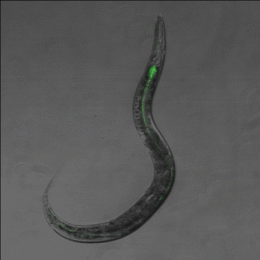Aging gene found to govern lifespan, immunity and resilience

(PhysOrg.com) -- Scientists funded by the Biotechnology and Biological Sciences Research Council (BBSRC) at the University of Birmingham have discovered that a gene called DAF-16 is strongly involved in determining the rate of ageing and average lifespan of the laboratory worm Caenorhabditis elegans (C. elegans) and its close evolutionary cousins. DAF-16 is found in many other animals, including humans. It is possible that this knowledge could open up new avenues for altering ageing, immunity and resistance to stresses in humans. The research is published today (01 April) in PLoS ONE.
Dr Robin May, who led the research said: "Ageing is a process that all organisms experience, but at very different rates. We know that, even between closely related species, average lifespans can vary enormously.
"We wanted to find out how normal ageing is being governed by genes and what effect these genes have on other traits, such as immunity. To do that, we looked at a gene that we already knew to be involved in the ageing process, called DAF-16, to see how it may determine the different rates of ageing in different species."
Dr May and colleagues compared longevity, stress resistance and immunity in four related species of worm (see notes for details). They also looked for differences in the activity of DAF-16 in each of the four species and found that they were all quite distinct in this respect. And, importantly, the differences in DAF-16 corresponded to differences in longevity, stress resistance and immunity between the four species - in general higher levels of DAF-16 activity correlated with longer life, increased stress resistance and better immunity against some infections.
Dr May continued: "DAF-16 is part of a group of genes that drive the biological processes involved in ageing, immunity and responses to physical or environmental stresses. The fact that subtle differences in DAF-16 between species seem to have such an impact on ageing and health is very interesting and may explain how differences in lifespan and related traits have arisen during evolution."
The research in Birmingham is now moving on to look at the way in which DAF-16 coordinates a complex network of genes in order to balance the differing needs of an individual's immune system over time.
Professor Douglas Kell said: "Research using model organisms that uncovers the biology underpinning ageing gives us the opportunity to understand some of the mechanisms that determine how humans age in a healthy, or at least normal, way. It is very important to develop a good understanding of healthy ageing if we are to appreciate what happens to an older person's physiology when they become unwell or experience difficulties with everyday tasks such as recalling memories or moving around. Improving the healthspan to mirror increases in the lifespan is an important subject of BBSRC research."















